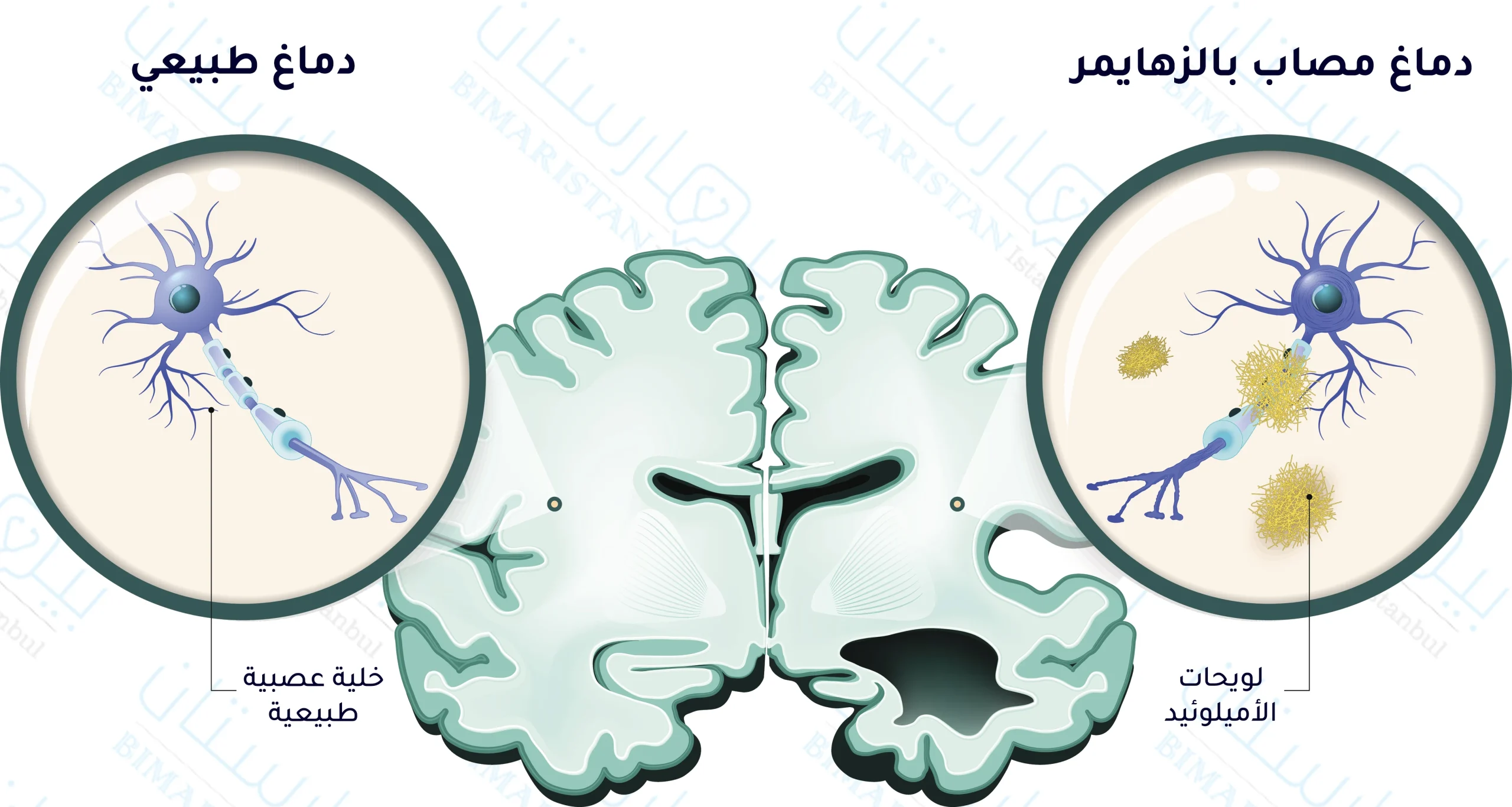مرض الزهايمر أكثر ما يخيف الإنسان عند تقدمه في العمر، لكن من المحزن معرفة أنه قد يصيب الشباب، معرفة أسباب الزهايمر المبكر عند الشباب ربما تساهم في تقليل الإصابة به.
مرض الزهايمر معروف لدينا بأنه مصاحب لتقدم العمر ويصيب كبار السن، لكن هل تعرف أنه يصيب الشباب أيضاً، فما أبرز أسباب الزهايمر المبكر عند الشباب؟
مرض الزهايمر المبكر عند الشباب
غالباً يرتبط مرض الزهايمر بتقدم العمر وكبر السن، وهو نوع من الخرف، يتصف هذا المرض بفقدان الذاكرة إلى حد ما ويؤثر على سلوكيات وتفكير المريض بحيث إنه لا يستطيع تذكر الأشخاص، والأحداث، والأشياء الأخرى.
تشترك عدة عوامل في ظهور المرض منها التغيرات التي تحدث في خلايا المخ بفعل تقدم العمر مع العوامل الجينية، بالإضافة إلى نمط الحياة الذي يعيشه الشخص والعوامل الخارجية الأخرى كإصابته ببعض الأمراض.
تقدم العمر وبالتحديد سن 65 فما فوق هو أشيع مرحلة يحدث عندها مرض الزهايمر، لكن في أحيان قليلة قد يُصاب الإنسان بمرض الزهايمر المبكر، قد تبدأ الأعراض من سن الثلاثين أو الأربعين أو الخمسين.
أسباب الزهايمر المبكر عند الشباب حتى الآن ليست معروفة بدقة لكن هناك أحد عوامل الخطر المعروفة التي قد تكون سبباً في ذلك وهي العوامل الوراثية.
كيف يحدث مرض الزهايمر المبكر عند الشباب؟
البحث عن أسباب مرض الزهايمر المبكر عند الشباب هو اتجاه الأبحاث العلمية، فمعرفة أسباب المرض تساعد في إيجاد العلاج المناسب له.
عند فحص جزء من خلايا المخ المصاب بمرض الزهايمر لوحظ ظهور شيئين موجودين لدى خلايا المخ السليم لكن لدى المخ المصاب بالزهايمر أكثر بكثير وهما اللويحات والتشابكات.
اللويحات:
تنشأ عندما تتحد أجزاء من بروتين البيتا أميلويد، البيتا أميلويد ينتج عن تكسر بروتين آخر أكبر موجود في الغشاء الدهني المحيط بالخلايا العصبية، تجمعات البيتا أميلويد أو اللويحات تغلق المسار العصبي بين الخلايا العصبي الذي تنتقل من خلاله الإشارات العصبية في منطقة التشابك العصبي، وهذا يحفز خلايا الجهاز المناعي التي تكون الالتهاب وتلتهم الخلايا المعطلة.
التشابكات:
بروتين يُسمى تاو يساعد على وجود الألياف العصبية مستقيمة، وبالتالي تستطيع المواد الغذائية وغيرها من المواد الهامة الانتقال بين الخلايا العصبية في المخ، في لحظة ما ينهار بروتين التاو وتصبح الألياف ملتوية بدل من أن تكون مستقيمة وهنا تُسمى التشابكات، بسبب تكون هذه التشابكات لن تصل المواد الغذائية للخلايا العصبية والتي ستموت لاحقاً.

أعراض الزهايمر المبكر عند الشباب
تتشابه أعراض مرض الزهايمر المبكر عند الشباب مع أعراض الزهايمر عند الكبار، وتنقسم الأعراض إلى أعراض مبكرة وأعراض متأخرة لكننا لن نخوض بهذه التقسيمات.
تشمل أعراض الزهايمر المبكر عند الشباب ما يلي:
- عدم تذكر الأشياء المهمة ونسيانها سيما المعلومات التي تعلمها الشخص حديثاً، بالإضافة إلى نسيان التواريخ الهامة
- تكرار استفسارات عن أشياء سبق السؤال عنها مراراً
- عدم القدرة على حل المشكلات الأساسية البسيطة بسبب فقدان التركيز مثل البحث عن أشياء، أو نسيان ماذا تفعل
- نسيان التاريخ والوقت الذي هو فيه
- التساؤل عن كيف وصل إلى المكان الذي فيه
- مشكلات في الرؤية
- صعوبة الدخول في حديث مع الأصدقاء أو الأسرة، وربما لا يستطيع أن يجد التعبيرات المناسبة لما يريد أن يتحدثه
- وضع الأشياء في مواضع وأماكن ليست موضعها، ونسيان أماكنها
- تغيرات في المزاج والشخصية وبالتالي قد ينسحب كثيراً من المواقف الاجتماعية وربما العمل
- الأعراض المتأخرة لمرض الزهايمر المبكر عند الشباب
- تقلبات مزاجية حادة وتغيرات في السلوك
- فقدان معرفة الزمن بشدة، واستغراب الأحداث وكيف وصل إلى مكانه
- الشك في كل من حوله حتى الأصدقاء والعائلة
- وجود صعوبة في الحديث، وربما حتى في البلع، أو في المشي
- فقدان الذاكرة الشديد
اقرأ المزيد حول: أعراض مرض الزهايمر وأسبابه.
تشخيص الإصابة بمرض الزهايمر المبكر وعلاجه عند الشباب
علامات التدهور العقلي التي وضحناها سابقاً هي أول دليل على احتمالية الإصابة بمرض الزهايمر المبكر عند الشباب، أيضاً وجود تاريخ عائلي للمرض قد يساعد في تشخيص المرض، يأتي بعد ذلك إجراء عدة فحوصات في تركيا لتأكيد الإصابة بالمرض وهي:
- بعض الاختبارات المعرفية لمعرفة قوة الذاكرة واختبار بعض المهارات العقلية والقدرة على حل المشكلات.
- إجراء تصوير مقطعي محوسب أو التصوير بأشعة الرنين المغناطيسي للمخ؛ هذا يظهر مقدار الضرر الموجود في خلايا المخ.

أما بالنسبة إلى علاج داء الزهايمر في تركيا فيتم عبر أدوية لتعويض النواقل العصبية المسؤولة عن الانتباه والذاكرة لدى المريض أو عبر تمارين ذهنية تقوم بتنشيط المخ وتحفزه على التفكير. في الواقع لقد تطور العلاج في تركيا بشكل كبير وبدأ بإدخال العديد من الأجهزة والتقنيات المتطورة منها تقنية التحفيز النبضي عبر الجمجمة TPS.
أهم أسباب الزهايمر المبكر عند الشباب
أسباب الزهايمر المبكر عند الشباب غير واضحة حتى الآن، لا يُعرف لماذا بعض الشباب لديهم قابلية للإصابة بمرض الزهايمر المبكر عن غيرهم، إلا أنه هناك بعض الاحتمالات البسيطة التي ربما تقود لذلك تتمثل في التالي:
- يوجد ثلاث طفرات جينية وجود واحدة منها أو الثلاثة معاً ربما يلعب دوراً في الإصابة بمرض الزهايمر، عند إصابة أحد الوالدين أو الأجداد بهذه الطفرات من الممكن أن تنتقل إلى الأحفاد فيما بعد، وجود واحدة أو أكثر من هذه الطفرات يجعل من الشخص أكثر عرضة للإصابة بمرض الزهايمر المبكر، هذه الطفرات هي: (APP أو PSEN1 أو PSEN2)، لكن ليس كل شخص لديه أحد هذه الطفرات من الممكن أن يُصاب بمرض الزهايمر لأنه وُجد أن 11% من مرضى الزهايمر المبكر لديهم هذه الطفرات واحدة منها أو جميعها.
- إصابة أحد الوالدين أو الأجداد بمرض الزهايمر المبكر عند الشباب يزيد من فرص الإصابة بالمرض عند الأولاد والأحفاد.

عوامل خطورة للإصابة بمرض الزهايمر المبكر
هناك مجموعة من العوامل تزيد فرص الإصابة بمرض الزهايمر سواء كان للشباب أو لكبار السن، وعوامل الخطورة هذه هي:
الإصابة ببعض الأمراض المزمنة
وجدت الدراسات أن الإصابة ببعض الأمراض مثل السكتة الدماغية، وأمراض القلب، وضغط الدم المرتفع من الممكن أن يزيد من الإصابة بمرض الزهايمر.
أمراض أخرى مثل السمنة ومرض السكر تزيد من عوامل خطر الإصابة بمرض الزهايمر.
نمط الحياة غير الصحي
هناك احتمالية تفرض أن نمط الحياة غير الصحيح قد يوصل الشخص إلى مرض الزهايمر خاصة في عمر متقدم.
نمط الحياة الصحي يتمثل في: أسلوب التغذية الصحيح، وممارسة الرياضة، والنوم جيداً، وتغذية العقل بالتعليم أو الاطلاع المستمر، كل هذا من الممكن أن يقلل فرص الإصابة بمرض الزهايمر خاصة مع تقدم العمر.
العوامل الوراثية وتاريخ العائلة المرضي بمرض الزهايمر أهم أسباب الزهايمر المبكر عند الشباب، من المهم تشخيص المرض باكراً للمساعدة في تقليل تقدم المرض ومحاولة علاج أعراض المرض قبل تقدم المرض.
المصادر:
